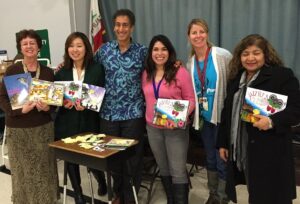
Greetings Teachers, Librarians and Administrators,
As schools gear up for another fall semester, there are still some days left to walk around in sandals, enjoy chilled watermelon, and daydream about how to make this year a great one for students. (As an author/speaker, I think about that too!)
If you’re like me and have been following the news from Washington, another question may also be tugging at you: how to square the behavior of some leaders with the citizenship values we try to instill in young people.
In today’s climate of sharp political divisions, the best and most powerful way to promote good citizenship is to model extra care and kindness toward everyone. As for the controversial communications from Washington, we can ignore them–or address them, turning negative news into “teachable moments.” In the spirit of option B, I’ll share some thoughts on three questions. Remember, when leading class discussions, try to link the topic to specific examples in the news, even if it’s just a tweet or a quote. Also, remember to stay objective and don’t take sides politically!
1) “Why do news programs make people angry?”
While news outlets work hard to keep citizens informed, they also compete to attract people’s attention. They know that disagreement and discord command attention. (If a fight breaks out in the schoolyard, do children stop what they’re doing and watch?) That’s why it’s so common to see news commentators arguing their points. Add to this culture a uniquely outspoken president who excels at saying things that provoke strong reactions. Critics claim that some of his statements are divisive and untrue. Supporters point out that he generates unprecedented attention. What are the advantages of generating attention? What are the advantages of being truthful? Can we always know what’s true?
2) “If grown-ups can insult others, why can’t I?”
While disagreeing with someone is OK, attacking them personally, or making fun of them, is not. Personal insults–about a person’s looks, family background, intelligence, etc.–are not acceptable, least of all when made publicly. (That includes cyberspace!) Sometimes, bullies insult others to make themselves feel powerful, or to warn others not to “cross” or displease them. Sometimes people lash out at others when they feel anger or frustration with how things are going. When leaders insult others they make some listeners cringe. But some listeners cheer them for not mincing words. Can your students describe how given put downs would make them feel? What are the best ways to handle such slights?
3) “Can whole groups of students be kicked out of school?”
Since the president started promising to deport undocumented immigrants, many students and families, understandably, feel stressed. No one wants to feel singled out or unwelcome. The Civil Rights Act of 1964 prohibits discrimination in public education based on race, color, sex, religion or national origin. Since our country was built on a system of checks and balances, courts have the power to block laws that are discriminatory. Also, many local groups around the country (including school districts and law enforcement) have declared that they would not go along with federal policies that target undocumented students. So even if a leader really wanted to discriminate, it wouldn’t be as easy as he or she may think.
During the upcoming school year, there will be lots of news to help children process. If the news out of Washington gets too dreary, students can use literature to learn about the world. Literature for young people is especially well grounded; sympathetic characters try to overcome problems. Shabby behavior goes unrewarded, and villains generally get their comeuppance. Values, entertainment and joy between book covers!
To learn more about my books and my musical, multilingual author assemblies at schools, please just hit reply. Meanwhile, keep jazzin’, and enjoy some last summer days without socks!
Matthew
Matthew Gollub (www.matthewgollub.com) is the author of numerous award-winning children’s books, including Jazz Fly 2: The Jungle Pachanga and Cool Melons–Turn to Frogs! (Jazz Fly 3 is in the works!) He has a passion for getting students excited about reading, and he has performed at over 1,000 schools. For information about his speaking events, including Spanish language assemblies at dual-immersion schools, please hit reply or contact him at mg@matthewgollub.com.
Reactions to author visits last year:
“THANK YOU, Matthew! The kids loved all your presentations. You obviously put your whole self into it…Everyone really seemed to enjoy the whole show–all of them.” –Debra Doering, Reading Specialist, Brookside Elementary School, Willits, CA
“I think Matthew Gollub and Cesar Chavez Elementary are a match made in heaven!” –Nadine Pinkerton, Librarian, Cesar Chavez Elementary, Davis, CA
“What a pleasure to host you once again. Thank you so much for your engaging presentation, energy, enthusiasm and awesome books!” –Alexandra Porrata, Loma Vista Immersion Academy, Petaluma, CA

|
